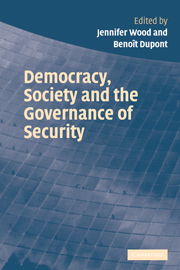Book contents
- Frontmatter
- Contents
- List of contributors
- Foreword
- Acknowledgements
- Introduction: Understanding the governance of security
- 1 Reflections on the refusal to acknowledge private governments
- 2 Transnational security governance
- 3 Two case studies of American anti-terrorism
- 4 Power struggles in the field of security: implications for democratic transformation
- 5 Policing and security as ‘club goods’: the new enclosures?
- 6 The state, the people and democratic policing: the case of South Africa
- 7 Necessary virtues: the legitimate place of the state in the production of security
- 8 From security to health
- 9 Research and innovation in the field of security: a nodal governance view
- Conclusion: The future of democracy
- References
- Index
Introduction: Understanding the governance of security
Published online by Cambridge University Press: 22 September 2009
- Frontmatter
- Contents
- List of contributors
- Foreword
- Acknowledgements
- Introduction: Understanding the governance of security
- 1 Reflections on the refusal to acknowledge private governments
- 2 Transnational security governance
- 3 Two case studies of American anti-terrorism
- 4 Power struggles in the field of security: implications for democratic transformation
- 5 Policing and security as ‘club goods’: the new enclosures?
- 6 The state, the people and democratic policing: the case of South Africa
- 7 Necessary virtues: the legitimate place of the state in the production of security
- 8 From security to health
- 9 Research and innovation in the field of security: a nodal governance view
- Conclusion: The future of democracy
- References
- Index
Summary
This collection of essays has an explanatory as well as a normative focus. On the one hand it tries to establish and clarify what it is that we know, as well as that which we don't know (at least very well), about the ways in which ‘security’ is thought about and promoted within diverse empirical contexts. Based on what we know, and recognizing what we don't know, this book shares some key concerns about how the advancement and protection of democratic values is being threatened or compromised by contemporary arrangements for security governance. In light of such worries, various theoretical and practical ideas for ways forward are argued, and in some cases vehemently so, by contributors to this volume.
What we, as editors, hoped for in preparing this book was to provide more structure to the ‘friendly dialogue’ that has been occurring between those advancing different descriptions and explanations of what has been happening and/or those offering different assessments of what is at stake for the future of democracy and what to do about it. In reading the chapters herein it will become clear that there is more agreement about what has been happening than there is about what to do about it. None the less, there remain important differences in the ways in which scholars describe and explain contemporary developments, reflecting their use of different conceptual and analytical tools.
- Type
- Chapter
- Information
- Democracy, Society and the Governance of Security , pp. 1 - 10Publisher: Cambridge University PressPrint publication year: 2006
- 7
- Cited by

